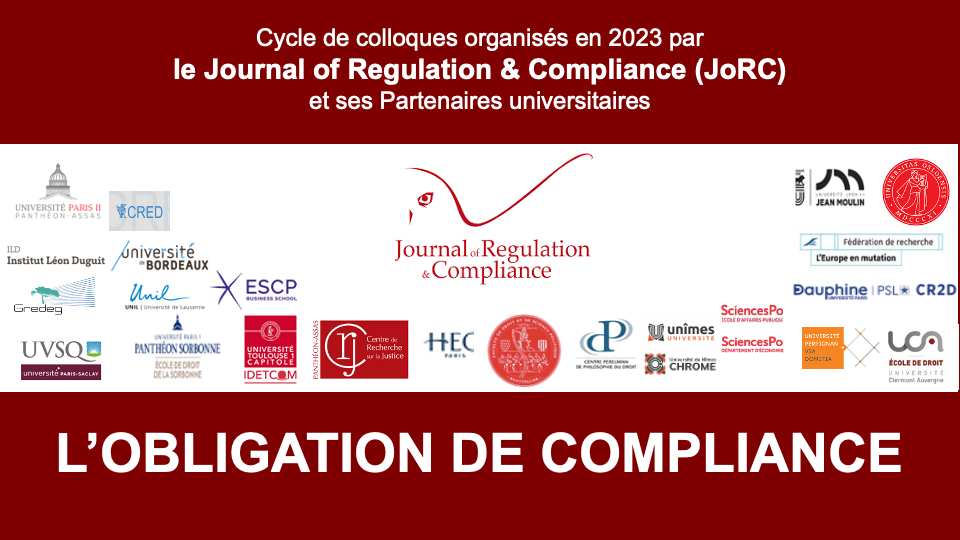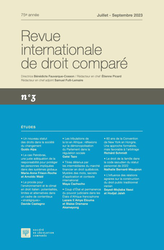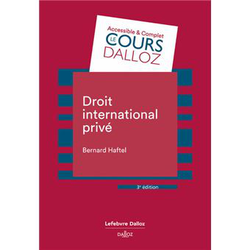Food for thoughts
Nov. 5, 2024
Publications

🌐follow Marie-Anne Frison-Roche on LinkedIn
🌐subscribe to the Newsletter MAFR Regulation, Compliance, Law
____
► Full Reference: M.-A. Frison-Roche, "Naissance d'une branche du Droit : le Droit de la Compliance" ("Birth of a branch of Law: Compliance Law"), in Mélanges offerts à Louis Vogel. La vie du droit, LexisNexis - Dalloz - LawLex - LGDJ, 2024, pp.177-188.
____
📝read the article (in French)
____
____
► English Summary of the article: The study focuses on the various movements that have given rise to Compliance Law, with particular emphasis on Competition Law.
After a preliminary reflection on the construction of the legal system into branches of Law, their classification in relation to each other, the difficulty encountered in this respect by Economic Law, and the various movements that give rise to one of them, the diversity of which the branch subsequently keeps track of, the study is constructed in 4 parts.
To find out what gave rise to Compliance Law, the first part invites everyone to reject the narrow perspective of a definition that is content to define it by the fact of "complying" with the applicable regulations in the sens to obey them automatically. This has the effect of increasing the effectiveness of the regulations, but it does not produce a branch of Law, being only an efficiency tool like any other.
The second part of the study aims to shed light on what appears to be an "enigma", because it is often claimed that this is the result of a flexible method through the "soft law", or of an American regulation (for instance FCPA), or of as many regulations as there are occasions to make. Instead, it appears that in the United States, in the aftermath of the 1929 crisis, it was a question of establishing an authority and rules to prevent another atrocious collapse of the system, while in Europe, in 1978, in memory of the use of files about Jews, it was a question of establishing an authority and rules to prevent an atrocious attack on human rights. A common element that aims for the future ("never again"), but not the same object of preventive rejection. This difference between the two births explains the uniqueness and diversity of the two Compliance Law, the tensions that can exist between the two, and the impossibility of obtaining a global Compliance Law.
The third part analyses the way in which Competition Law has given rise to conformity mechanisms: they had only constituted a secondary branch which is a guarantee of conformity with competition regulations. Developed in particular through the soft law issued by the competition authorities, the result is a kind of "soft obedience", a well-understood collaboration of a procedural type through which the company educates, monitors and even sanctions, without going outside Competition Law, of which compliance (in the sens of conformity) is the appendix. The distance between a conformity culture and Compliance Law can be measured here.
The fourth part aims to show that Competition Law and Compliance Law are two autonomous and articulated branches of Law. Since Compliance Law is a autonomous and strong branch of Law built around Monumental Goals, in particular the sustainability of systems and the preservation of the human beings involved so that they are not crushed by these systems but benefit from them : the current challenge of European integration is to build the pillar of Compliance Law alongside the competitive pillar. Jurisdictions are in the process of doing this and articulating them.
________
Oct. 29, 2024
Thesaurus : Doctrine

► Référence complète : Mélanges offerts à Louis Vogel. La vie du droit, LexisNexis - Dalloz - LawLex - LGDJ, 2024, 828 p.
____
____
📗lire la table des contributions
____
► Présentation de l'ouvrage (faite par l'éditeur) : "Le droit est une matière vivante qui organise le monde réel et, comme Louis Vogel, évolue sans cesse.
Guidé par sa très forte envie d’agir, Louis Vogel a, dans chaque partie de sa vie professionnelle, fortement fait progresser la situation qu’il a trouvée à l’origine.
À l’Université, il apporte une contribution décisive, d’abord comme professeur, au travers de ses nombreux ouvrages et des masters qu’il a fondés et dirigés, notamment en droit économique français et européen ; ensuite, comme président de l’université Panthéon-Assas et président de France Universités, il réforme en profondeur, saisissant toujours toutes les opportunités.
Comme avocat, aux côtés de son frère Joseph, il fonde un cabinet spécialisé en droit de la concurrence, qui conseille les plus grands noms du secteur de l’automobile, de l’audiovisuel, de la distribution… et qui, dans de nombreuses affaires, fait évoluer la jurisprudence. Toujours ouvert aux nouveautés, Louis Vogel travaille, en parallèle, sur l’application de l’intelligence artificielle au droit.
En politique, comme maire et président de l’agglomération de Melun puis, plus récemment, comme sénateur, il poursuit son action au service de la collectivité et, après, en tant que professeur, avoir enseigné le droit et, en tant qu’avocat, l’avoir appliqué, désormais, en tant que sénateur, il le crée.
Convaincu que la liberté, la prudence et la confiance conditionnent la réussite, Louis Vogel a, durant toutes ces années, accompagné, et souvent, anticipé les mutations de notre société. La richesse et la diversité des articles composant ses Mélanges démontrent qu’il a transmis à ceux qui ont cheminé avec lui cette curiosité et cette humanité."
____
📝lire une présentation de l'article de Marie-Anne Frison-Roche : "Naissances d'une branche du Droit : le Droit de la Compliance"
________
Oct. 17, 2024
Thesaurus : Doctrine
► Référence complète : G. Blanc, "Les chaînes de valeur mondiales : approche juridique", JCP E, 17 oct. 2024, n° 42, étude 1300, pp. 19-25
____
► Résumé de l'article (fait par l'auteur) : "Le cycle de vie des produits manufacturés s’inscrit aujourd’hui généralement dans le cadre de chaînes de valeur souvent mondiales. Ces chaînes de valeur sont structurées soit par des groupes de contrats, soit par le biais de groupes de sociétés, soit en ayant recours à ces deux outils. Ces chaînes de valeur étant transfrontières, leur activité se trouve soumise à des réglementations diverses, notamment aux nouvelles règles de RSE telles que celles issues de la récente directive sur le devoir de vigilance.".
____
🦉Cet article est accessible en texte intégral pour les personnes inscrites aux enseignements de la Professeure Marie-Anne Frison-Roche
________
Oct. 10, 2024
Interviews

🌐follow Marie-Anne Frison-Roche on LinkedIn
🌐subscribe to the Newsletter MAFR. Regulation, Compliance, Law
🌐subscribe to the Newsletter Surplomb, by MAFR
____
► Full Reference: M.-A. Frison-Roche, E. Silva Romero, G. Filhol, V. Autret, B. Sillaman et K. Hennessee, Compliance & arbitrage : les prémices d’une symbiose, propos recueillis par O. Delaunay, LJA Magazine, septembre-octobre 2024, pp. 12-20
____
💬read the collective interview (in French)
____
🌐read the presentation of this interview on LinkedIn
____
► Topics covered during this collective interview:
-
The development of Compliance in an international environment
-
The Arbitrator and the concept of Compliance
-
Linking Arbitration and Compliance systems
____
► Summary of my interventions: Compliance Law appears to be developing in the context of international trade and Arbitration.
For my part, I placed particular emphasis on the fact that the first reports were the result of "negative reports" between Compliance and Arbitration, through Criminal Law and the obligation of arbitrators to ensure that they don't give effectivity to pacts of corruption. But the future lies in a more 'positive' and fruitful relationship between this new branch of law, Compliance Law, and the solid prospect offered by Arbitration, in that the arbitrator, this natural judge of international trade, will be able to support the contractualisation of Compliance obligations, particularly about due diligences in structural chains of activities and duty of vigilance.
Thus competent, the international arbitrator must respond to what the Monumental Goals in which Compliance Law is rooted expect of him/her: to provide solutions and remedies to issues that often concern an entire chain of activity or an entire sector in a more systemic perspective than in a traditional conception. This applies not only to investment arbitration, but also, for instance, to infrastructure arbitration. The concern for sustainability and the systemic perspective must be integrated into the reasoning and produce appropriate case law, a sort of new doctrine in the arbitration order, that will make more attractive the arbitration place that will most solidly link the skills of specialists in Compliance Law and Arbitration Law.
________
Sept. 18, 2024
Thesaurus : Doctrine
► Référence complète : C. Letoublon, "Responsabilité sociale et environnementale des entreprises multinationales : le devoir de diligence et la protection de l’environnement", L. Boisson de Chazournes dir.), L’Effectivité du droit international face à l’urgence écologique, Collège de France, 2024, pp. 127-146.
____
📝cet article est en libre accès : lire l'article
________
Sept. 8, 2024
Law by Illustrations

► Référence complète : M.-A. Frison-Roche., "Un martyr au service du Droit et de la Justice, caché sous un titre d'un quelconque thriller : 𝑴𝒆𝒏𝒂𝒄𝒆 𝒂𝒖 𝒔𝒐𝒎𝒎𝒆𝒕", billet septembre 2024.
► voir le film-annonce
___
En 2023, sort un film suédois.
Il est présenté comme un "thriller au suspense insoutenable", ce que son titre français soutient : 𝑴𝒆𝒏𝒂𝒄𝒆 𝒂𝒖 𝒔𝒐𝒎𝒎𝒆𝒕.
Ce n'est pas un thriller. Il n'y a pas une menace au sommet. Et cela n'est pa insoutenable.
C'est l'histoire d'un homme seul.
Pourtant quand il revient 3 jours à sa vie, en Suède, avec ses amis, il est comme vous et moi : il déjeune dans un jardin, respire l'air frais, voudrait bien acheter une jolie petite maison, demande des nouvelles de la famille.
Mais quand il remplit son office, il est seul.
Il a tout pour être absolument seul.
Nous sommes au début des années 60.
Il vit à New-York et travaille toute la journée. Lorsqu'on est le Secrétaire Général de l'ONU l'on a peu de temps pour aller dans des dîners, pour se promener avec un chien dans Central Park. Un chien, des enfants, une femme, il n'en a pas. Il a un petit singe, qu'il a ramené de Somalie, sans doute un des nombreux pays où il a été pour aider, aider, aider. Peut-être avec succès ou pas. Peut-être de la bonne façon ou pas. Cela n'est pas dit, ce que l'on voit, c'est son petit singe qui est sur son épaule, qui s'asseoit sur sa feuille où il peut enfin s'exprimer dans sa langue natale, qui court sur son table où il dine seul, toujours seul.
Il est toujours habillé pareil.
Chaque matin, il met une chemise blanche identique à celle de la veille. Chaque matin, il lace ses chaussures.
Car chaque matin, il va à son bureau pour que lui tombe dessus les catastrophes, les urgences, les drames, les situations insolubles.
A chaque fois, il essaie de trouver la moins pire des solutions, de trouver les moins pires des interlocuteurs. Et il rentre chez lui.
Pourquoi faire cela ?
Il écrit en suédois, avec son petit singe sur son épaule que dans sa solitude, qui n'est pas un drame, qui est son état, il faut trouver ce pourquoi il faut se sacrifier.
Il a déjà consacré toutes les années précédentes à accompagner la décolonisation ; il croit au droit des peuples à disposer d'eux-mêmes. Il fait tout ce qu'il peut pour que la décolonisation se passe le moins mal possible en Afrique à l'égard des pays européens et maintenant que les pays ne soient pas tenus par les Etats-Unis et l'Union Soviétique.
il ne fait que travailler.
Hegel appellerait cela un fonctionnaire, mais l'on nous dit que ce film n'est pas un cours de philosophie politique, puisque c'est un "thriller au suspense insoutenable".
Un jour, un coup d'Etat arrive dans un de ces pays d'Afrique.
Le Premier Ministre de ce pays vient le voir pour le dire, que le pays va être dépecé car une province aux ressources minières convoitée qui doit être détachée pour être mieux tenue par ceux d'avant, que lui-même est en danger, qu'il faut qu'il fasse quelque chose.
Il répond qu'il lui faut un peu de temps.
Le Premier Ministre revient dans son pays. Il est immédiatement assassiné.
Des massacres débutent.
Une guerre civile menace.
La province dans laquelle sont ces ressources minières considérables notamment pour la fabrication de la bombe atomique, déclare sa secession. Des industriels étrangers se réunissent. Des réunions se tiennent dans le pays avec le nouveau président avec des représentants des divers intérêts.
Le Secrétaire Général dit : nous allons envoyer des casques bleus et ensuite nous réunirons le Conseil de Sécurité.
En cela, il se condamne.
Il est critiqué de tous les côtés.
Le Conseil de sécurité se réunit.

Lors de la réunion de celui-ci, l'URSS demande sa démission immédiate car en envoyant les casques bleus dans ce qui est en réalité une opération militaire il a excédé ses pouvoirs et il a pris parti.
Il répond qu'il a été mandaté pour que l'ONU accompagne la décolonisation et que les pays concernés soient en paix, que la paix est la mission de l'ONU, que la paix implique que les pays décolonisés ne soient pas soumis à la puissance de l'un ou l'autre des deux blocs qui sont à la manœuvre en alliance avec les industries impliquées.
En disant cela, il se condamne une deuxième fois.
Il revient dans son bureau où il apprend que son compagnon le petit singe s'est libéré de sa petite cage capitonnée de velours rouge où il demeure quand il attend son retour , a grimpé dans l'escalier, s'est étranglé par la fine laisse qui lui entourait le cou et qu'il est mort. Leur sort est parallèle, ce n'est qu'une anticipation. Il répond qu'il veut qu'on ôte son cadavre pour qu'il n'ait pas à voir son cadavre en rentrant (il n'est pas masochiste, juste dévoué à ce qu'il pense être juste).
Dans le pays les massacres continuent. Il décide d'aller lui-même rencontrer le président qui avait dans un premier temps accepté sa proposition de réunifier le pays puis a tout rejeté en bloc.
Il se condamne donc une troisième fois.
Il n'y a aucun suspense dans ce film.
Dans l'avion, son lacet de chaussure se casse. Il n'en a pris de rechange. Mais son collaborateur lui passe le sien.
Malgré toutes les précautions prises pour que son avion ne soit pas repéré, l'avion a un accident en plein vol. Il n'y a pas de survivant.
La Suède se met en silence pour lui rendre hommage : le film s'achève sur les images d'archives d'un peuple recueilli.
Plus tard à titre posthume il recevra le prix Nobel de la Paix.
____
Voilà la vie d'un homme droit ;
Appliquer le Droit, comme on peut, le moins mal possible donc.
Se faire menacer, injurier, sanctionner.
Etre inconnu du grand public
Exercer son pouvoir en se basant sur ce pour quoi il a été donné
Essayer de ne donner prise à personne, ni dans son habillement, ni dans son comportement (il aimerait se rapprocher de son ami qu'il aime depuis toujours, mais il ne le veut pas pour ne pas donner prise).
Travailler jusqu'à l'épuisement (il dort sur le canapé de son bureau, prend une douche pour partir au Conseil de sécurité)
Dire la vérité.
N'avoir de reconnaissance et de prix qu'une fois mort.
C'est un documentaire sur Dag Hammarskjöld, ce qu'est l'intégrité et l'amour du Droit (ici le Droit international public) en ce qu'il sert la Justice.
J'aurais volontiers appelé ce film : Le martyr , mais je ne sais pas faire de "thriller au suspense insoutenable".
Le titre suédois du film est simplement le nom de cette personne : 𝑯𝒂𝒎𝒎𝒂𝒓𝒔𝒌𝒋ö𝒍𝒅,


Dag Hammarskjöld,
____
Aug. 14, 2024
Editorial responsibilities : Direction of the collection "Cours-Série Droit privé", Editions Dalloz (33)

► Référence complète : Ch. André, Droit pénal spécial, Dalloz, coll. "Cours Dalloz - Série Droit privé", 1ière éd., 2010, 7ième éd., 2021, 552 p.
____
► Présentation de l'ouvrage : La 6ième édition de ce Cours est à jour des réformes qui continuellement modifient les infractions pénales, notamment en matière économique et financière mais aussi sociales (par exemple les "gilets jaunes"), montrant avant tout la constante de la crise d'un droit pénal déliquescent et désormais éclaté en droits répressifs spéciaux. Aujourd'hui c'est non seulement un droit pénal spécial mais encore voire avant tout un droit pénal d'exceptions (ce qui pose problème au regard du droit pénal général, lequel est indissociable de la procédure pénal) qu'il faut apprendre, étudiants comme praticiens.
Ce Cours est construit en trois parties.
La première traite des infractions contre les personnes ; la deuxième des infractions contre les biens ; la troisième contres la Nation, l'État et la paix publique.
Les éléments de procédure pénale, indissociables du droit pénal, sont expliqués à chaque infraction explicitée.
____
📕lire la quatrième de couverture
____
📕lire la table des matières
____
📚Consulter l'ensemble de la collection dans laquelle l'ouvrage a été publié
____
📚Sont directement corrélés à cet ouvrage :
________
July 23, 2024
Thesaurus : Doctrine
► Référence complète : A. Supiot, "L'esprit des lois à l'époque globale", RIDE, 2023, n° 3-4, pp. 5-22
____
► Résumé de l'article (fait par l'auteur) : "La nécessaire critique de la globalisation ne doit pas conduire à céder aux passions identitaires, mais bien au contraire à œuvrer à un nouvel ordre international fondé sur l’apprentissage mutuel et la solidarité des peuples, pour relever ensemble les défis écologiques, sociaux et technologiques des temps présents. Cette voie serait celle d’une véritable mondialisation, qui reconnaîtrait la souveraineté de la limite ainsi que la dette de vie entre générations, et romprait avec l’universalisme en surplomb, sûr d’incarner la raison, pour cultiver un universalisme en creuset, attentif à la diversité des langues, des histoires et des cultures.".
____
🦉Cet article est accessible en texte intégral pour les personnes inscrites aux enseignements de la Professeure Marie-Anne Frison-Roche
________
April 27, 2024
Interviews

► Full reference: E. Silva-Romero, "Droit de la Compliance : Arbitrage International et géopolitique" ("Compliance Law: International Arbitration and Geopolitics"), interview conducted by M.-A. Frison-Roche as part of a series of interviews on Compliance Law, in Fenêtres ouvertes sur la gestion (Open windows on management), broadcast by J.-Ph. Denis, Xerfi Canal, recorded December 12, 2023, recorded April 27, 2024
____
🌐consult the presentation of Eduardo Silva-Romero's interview on LinkedIn
____
🎥view the full interview on Xerfi Canal
____
► Starting point: In 2023, Eduardo Silva-Romero wrote a contribution:📝What place is there for compliance in investment arbitration?, in the book 📘Compliance Jurisdictionalisation
🧱read the presentation of this contribution ➡️click HERE
____
► Summary of interview:
Marie-Anne Frison-Roche. Question: What is the place of Compliance in international investment arbitration and, first of all, what is its specificity?
Edouardo Silva-Romero. Answer: International investment arbitration is based on a treaty, generally signed between two States, which agree to protect the investments that companies make in the host State. The resulting disputes may give rise to this specific type of arbitration.
Compliance has a special place here, because if the investment is tainted by corruption or fails to respect human rights, it will not be protected by the arbitrators, as the host state is no longer bound.
____
MaFR. Q.: So, through Compliance, states can assert their sovereignty?
E.S-R. A.: Yes, through the social dimension of Compliance, States can assert their social conception and impose it in investment arbitration.
____
MaFR. Q.: Is the attractiveness of the Paris marketplace enhanced?
E.S-R. A.: The International Court of Arbitration is headquartered in Paris, and it's clear that this presence, combined with Compliance's humanistic approach to investment arbitration, is an essential element of attractiveness. Because of the technicalities involved, it is essential for international arbitrators to master compliance law in order to participate in this new element of attractiveness, as it takes the form of rules of public order, and this is also how the Paris Court of Appeal exercises its control over awards.
________
April 18, 2024
Publications

🌐follow Marie-Anne Frison-Roche on LinkedIn
🌐subscribe to the Newsletter MAFR Regulation, Compliance, Law
🌐subscribe to the Video Newsletter MAFR Surplomb
____
► Full reference: M.-A. Frison-Roche, "L’usage des puissances privées par le droit de la compliance pour servir les droits de l’homme" (Use of private companies by Compliance Law to serve Human Rights) , in J. Andriantsimbazovina (dir.), Puissances privées et droits de l'Homme. Essai d'analyse juridique, Mare Martin, coll. "Horizons européens", 2024, pp. 279-295
____
🚧read the Bilingual Working Paper on which this article is based, with more technical developments, references and hypertext links
____
► English Summary of this article: Following the legal tradition, Law creates a link between power with a legitimate source, the State, public power being its prerogative, while private companies exercise their power only in the shadow of this public power exercised ex ante. The triviality of Economic Law, of which Competition Law is at the heart, consisting of the activity of companies that use their power on markets, relegates the action of the State to the rank of an exception, admissible if the State, which claims to exercise this contrary power, justifies it. The distribution of roles is thus reversed, in that the places are exchanged, but the model of opposition is shared. This model of opposition exhausts the forces of the organisations, which are relegated to being the exception. However, if we want to achieve great ambitions, for example to give concrete reality to human rights beyond the legal system within which the public authorities exercise their normative powers, we must rely on a new branch of Law, remarkable for its pragmatism and the scope of the ambitions, including humanist ambitions, that it embodies: Compliance Law.
Compliance Law is thus the branch of Law which makes the concern for others, concretised by human rights, borne by the entities in a position to satisfy it, that is to say the systemic entities, of which the large companies are the direct subjects of law (I). The result is a new division between Public Authorities, legitimate to formulate the Monumental Goal of protecting human beings, and private organisations, which adjust to this according to the type of human rights and the means put in place to preserve them. Corporations are sought after because they are powerful, in that they are in a position to make human rights a reality, in their indifference to territory, in the centralisation of Information, technologies and economic, human, and financial means. This alliance is essential to ensure that the system does not lead to a transfer of political choices from Public Authorities to private companies; this alliance leads to systemic efficiency. The result is a new definition of sovereignty as we see it taking shape in the digital space, which is not a particular sector since it is the world that has been digitalised, the climate issue justifying the same new distribution of roles (II).
____
📝read the article (in French)
________

Feb. 9, 2024
Organization of scientific events

🌐follow Marie-Anne Frison-Roche on LinkedIn
🌐subscribe to the Newsletter MAFR Regulation, Compliance, Law
____
► Full Reference: L. Aynès, M.-A. Frison-Roche, J.-B. Racine and E. Silva-Romero (dir.), L'arbitrage international en renfort de l'obligation de Compliance (International Arbitration in support of the Compliance Obligation), Journal of Regulation & Compliance (JoRC) and Institute of World Business Law of the ICC (Institute), Conseil Économique Social et Environnemental (CESE), Paris, February 9, 2024
____
____
🏗️This symposium takes place in the cycle of symposiums organised by the Journal of Regulation & Compliance (JoRC) and its partners Universities, focusing in 2023-2024 on the general theme of the Compliance Obligation
____
📚The works will then be inserted in the books:
📕L'obligation de Compliance, to be published in the 📚Régulations & Compliance Serie, co-published by the Journal of Regulation & Compliance (JoRC) and Dalloz, published in French.
📘Compliance Obligation, to be published on the 📚Compliance & Regulation Serie, co-published by the Journal of Regulation & Compliance (JoRC) and Dalloz, published in English.
____
► General presentation of the symposium: "Compliance Obligation" appears to be far from International Arbitration if Compliance Law is only understood in terms of binding regulations or even Criminal Law. Arbitration would only have contact with Compliance Obligation in a repulsive way, when a person claims to have enforced a contract before an arbitration court that disregards a compliance prohibition, e.g. corruption or money laundering. It is therefore from a negative angle that the cross-over has taken place.
The fact that Arbitration Law respects the requisite of Criminal Law is nothing new. Moreover, the power of Compliance in its detection and prevention tools, particularly in terms of evidence, no doubt increases the global efficiency.
But Compliance Obligation is based on Monumental Goals, notably linked to global human rights and active ambitions about environment and climate which, particularly in the value chain economy, take the legal form of compliance clauses, or even compliance contracts, or various commitments and plans, which the parties can ask the international arbitrator to enforce. They will do so even more as arbitrators are often the only international, or even global, judges available.
The use they will do of Contract Law, Quasi-Contract Law, Enforcement Law, Tort Law, reinforces Compliance Law in a global dimension.
____


____
► Interviennent :
🎤 Laurent Aynès, emeritus Professor at Paris 1 Panthéon-Sorbonne University, Attorney, Darrois Villey Maillot Brochier (Paris)
🎤 Marie-Anne Frison-Roche, Professor of Regulatory and Compliance Law, Director of the Journal of Regulation & Compliance (JoRC)
🎤 Jean-François Guillemin, former General Secretary of the Bouygues Group
🎤 Christophe Lapp, Attorney, Advant Altana (Paris)
🎤 Jean-Baptiste Racine, Full Professor at Paris Panthéon-Assas University (Paris 2)
🎤 Eduardo Silva-Romero, President of the Institute of World Business Law of the ICC (Institute), Attorney, Wordstone (Paris)
____
🧮Read a detailed presentation of the event below⤵️
Feb. 9, 2024
Conferences

🌐follow Marie-Anne Frison-Roche on LinkedIn
🌐subscribe to the Newsletter MAFR Regulation, Compliance, Law
____
► Full Reference: M.-A. Frison-Roche, "Préalable : ce qu'est un engagement" ("Prerequisite: the Commitment"), in L. Aynès, M.-A. Frison-Roche, J.-B. Racine and E. Silva-Romero (dir.), L'arbitrage international en renfort de l'obligation de Compliance (International Arbitration in support of the Compliance Obligation), Journal of Regulation & Compliance (JoRC) and Institute of World Business Law of the ICC (Institute), Conseil Économique Social et Environnemental (CESE), Paris, February 9, 2024
____
🧮see the full programme of this event
____
🌐consult on LinkedIn a general presentation of this event, which links to a presentation of each speech (in French)
____
____
🔲see the slides used to support the presentation (in French)
____
🎤see a presentation of the conference "Préalable : ce qu'est l'Obligation de Compliance" ("Prerequisite: what is the Compliance Obligation"), given at the same symposium
____
🎤see a presentation of the conference "Le renforcement des engagements de Compliance par le renvoi Ex Ante à l'arbitrage international" ("Reinforcing Compliance commitments by referring Ex Ante to International Arbitration") which was finally not pronounced but will be the subject of an 📝article in the forthcoming book 📘Compliance Obligation
____
► Presentation of the conference: Having defined the Compliance Obligation in "Préalable : ce qu'est l'Obligation de Compliance" ("Prerequisite: what is the Compliance Obligation"), I set out to define what a commitment is.
No one doubts that commitments, as words, constitute facts that can engage the liability of companies if there are inconsistencies or lies. The question today is whether a commitment can constitute a legal act, binding in ex ante.
Companies make commitments either to fulfil their legal Compliance obligations, which is simply obeying the law, or to express their own wishes, either for themselves or for others. The cases are often confused, even though the scope is not the same.
If the commitment takes the form of a contract, Compliance is concerned if the contract is used as an Ex Ante Compliance Tool📎
The commitment, a concept that comes more from the Economics of Regulation, was conceived between a Regulatory Authority and a Company: it is the unilateral decision of the Authority that gives legal force to the commitment. Case law confirms this (Conseil d'État (French Council of State)📎
If commitment is central to Compliance, particularly Vigilance, it is because Compliance Law is an extension of Regulatory Law📎
In drawing up a plan, the company is fulfilling its legal obligation. But if we were to consider that it is a commitment, then we would also have to consider that the plan is the result of its will, that it must consult the stakeholders in its preparation, but that the source of the plan is its will: the provisions are not stipulations, are not applications of the law, but unilateral voluntary provisions.
In this respect, and because its source is the will of the company (which does not prevent its co-construction), a plan could contain a "graduated offer" of arbitration.
This offer could be included in commitments that are less regulated by law, such as those made in the context of CSR.
________
🕴️M.-A. Frison-Roche (ed.), 📘Compliance Tools, 2021.
Feb. 9, 2024
Conferences

🌐follow Marie-Anne Frison-Roche on LinkedIn
🌐subscribe to the Newsletter MAFR Regulation, Compliance, Law
____
► Full Reference: M.-A. Frison-Roche, "Préalable : ce qu'est l'obligation de Compliance" ("Prerequisite: the Compliance Obligation"), in L. Aynès, M.-A. Frison-Roche, J.-B. Racine and E. Silva-Romero (dir.), L'arbitrage international en renfort de l'obligation de Compliance (International Arbitration in support of the Compliance Obligation), Journal of Regulation & Compliance (JoRC) and Institute of World Business Law of the ICC (Institute), Conseil Économique Social et Environnemental (CESE), Paris, February 9, 2024
____
🧮see the full programme of this event
____
🌐consult on LinkedIn a general presentation of this event, which links to a presentation of each speech (in French)
____
____
🔲see the slides used to support the presentation (in French)
____
🎤see a presentation of the conference "Préalable : ce qu'est un engagement" ("Prerequisite: the Commitment"), given at the same symposium
____
🎤see a presentation of the conference "Le renforcement des engagements de Compliance par le renvoi Ex Ante à l'arbitrage international" ("Reinforcing Compliance commitments by referring Ex Ante to International Arbitration") which was finally not pronounced but will be the subject of an 📝article in the forthcoming book 📘Compliance Obligation
____
► Presentation of the conference: I have first dealt with the very definition of the Compliance Obligation.
After showing that the relationship between Compliance Law and International Arbitration will naturally develop, because the companies subject to it are international, because they contractualise their legal Compliance obligations and because Compliance is being jurisdictionalised📎
This culture of compliance is achieved either through compliance contracts📎
The obligation of Compliance which then takes concrete form consists for the company not in making effective Ex Ante all the regulations which apply to it (conception of conformity which is at once unreasonable, blind and impossible), but in making its best efforts, which it must make visible (see Compliance Evidence System📎
These Monumental Goals are systemic. The aim is to protect systems from collapse (Negative Monumental Goals) or to make them better (Positive Monumental Goals)📎
The role of the Judge, and therefore also that of the Arbitrator, is renewed.
________
🕴️M.-A. Frison-Roche (ed.), 📘Compliance Jurisdictionalisation, 2024.
🕴️M.-A. Frison-Roche, 📝The Judge, the Compliance Obligation and the Company. The Compliance Evidence System, in 🕴️M.-A. Frison-Roche (ed.), 📘Compliance Jurisdictionalisation, 2024.
🕴️M.-A. Frison-Roche, 📝Compliance Monumental Goals, Beating Heart of Compliance Law, in🕴️M.-A. Frison-Roche (ed.), 📘Compliance Monumental Goals, 2023.
Feb. 9, 2024
Conferences

🌐follow Marie-Anne Frison-Roche on LinkedIn
🌐subscribe to the Newsletter MAFR Regulation, Compliance, Law
____
► Full Reference: M.-A. Frison-Roche, "Le renforcement des engagements de Compliance par le renvoi Ex Ante à l'arbitrage international" ("Reinforcing Compliance commitments by referring Ex Ante to International Arbitration"), in L. Aynès, M.-A. Frison-Roche, J.-B. Racine and E. Silva-Romero (dir.), L'arbitrage international en renfort de l'obligation de Compliance (International Arbitration in support of the Compliance Obligation), Journal of Regulation & Compliance (JoRC) and Institute of World Business Law of the ICC (Institute), Conseil Économique Social et Environnemental (CESE), Paris, February 9, 2024
____
🧮see the full programme of this event
____
🌐consult on LinkedIn a general presentation of this event, which links to a presentation of each speech (in French)
____
____
🔲see the slides used to support the presentation (in French)
____
📝This conference and the Working Paper on which it is based are to be linked with the article to be published in the book📘Compliance Obligation
____
🎤see a presentation of the conference "Préalable : ce qu'est l'Obligation de Compliance" ("Prerequisite: what is the Compliance Obligation"), given at the same symposium
____
🎤see a presentation of the conference "Préalable : ce qu'est un engagement" ("Prerequisite: the Commitment"), given at the same symposium
____
► Presentation of the conference: It was initially planned that I would speak on the subject Le renforcement des engagements de Compliance par le renvoi Ex Ante à l'arbitrage international (Reinforcing Compliance commitments through the Ex Ante referral to International Arbitration), but it was agreed with the other organisers of the symposium that after defining the concept of the Compliance Obligation📎
- The inclusion of an offer of arbitration in the field of Compliance implies considering it in a contract as well as in a non-contractual commitment, and studying which category of Compliance Obligation the offer may apply to.
- This insertion benefits from taking the form of a "graduated offer", in a crescendo organised by the company ex ante and offered to the stakeholders: conciliation, mediation and arbitration, in "circles of trust"📎
!footnote-3387 . This is supported by the current French amicable settlement policy. - The result was that I had to prepare a long "preliminary" discussion of what a "commitment" is, without which it seemed difficult to talk in concrete terms about the effective insertion of an offer of arbitration if we did not know whether such links or words had a constraining effect on the person issuing them in relation to the person benefiting from them. After discussions with the other speakers, it became clear that it would be more effective to give a talk devoted solely to the question of the legal definition of commitment. We therefore decided to allocate this second speaking slot to the notion of commitment. Since the written words do not have the same constraints, it will take up the initial construction, insisting on the different supports, either compliance contracts, or associations with compliance clauses, relating to different Compliance obligations, in particular on information or audit or Vigilance📎
!footnote-3388 , because the company must have the legal power corresponding to the mission that the State entrusts to it through Compliance📎!footnote-3389 . - The offer must be carefully drafted to explain its purpose, and its organisation must prove the reality of this purpose: to give access to a judge to people affected by the company's activity, and not to block it.
- This will therefore be available in detail in the forthcoming books:
- M.-A. Frison-Roche (ed.), 📕L'obligation de Compliance
- M.-A. Frison-Roche (ed.), 📘Compliance Obligation
________
🕴️M.-A. Frison-Roche, 🎤Préalable : ce qu'est l'obligation de Compliance (Prerequisite: the Compliance Obligation), in 🧮L'arbitrage international en renfort de l'obligation de Compliance (International Arbitration in support of the Compliance Obligation), 2024.
M.-A. Frison-Roche, Préalable : ce qu'est un engagement
🕴️M.-A. Frison-Roche, 🎤Préalable : ce qu'est un engagement (Prerequisite: the Commitment), in 🧮L'arbitrage international en renfort de l'obligation de Compliance (International Arbitration in support of the Compliance Obligation), 2024.
🕴️M.-A. Frison-Roche, 🚧Compliance and Trust, 2017.
🕴️M.-A. Frison-Roche, 🚧Conceiving Power, 2021.
Feb. 1, 2024
Teachings

🌐follow Marie-Anne Frison-Roche on LinkedIn
🌐subscribe to the Newsletter MAFR Regulation, Compliance, Law
____
► Full Reference: F. Ancel & M.-A. Frison-Roche, Droit de la compliance (Compliance Law), École nationale de la magistrature - ENM (French National School for the Judiciary), in collaboration with the École de Formation professionnelle des Barreaux du ressort de la cour d'appel de Paris - EFB (Paris Bar School), Paris, February 1 and 2, 2024
This teaching is given in French.
____
____
► Presentation of the Teaching: The aim of this two-day conference is to enable judges and lawyers to grasp the issues, objectives and methods that define Compliance Law as it is practised in companies.
The speakers will illustrate the growing trend towards litigation, which is difficult to reconcile with the supranational dimension, or even indifference to territories, for example when disputes concern systemic climate or digital issues: the result is a renewal of the role of the judge and the role of lawyers.
This must be set against the renewal of the role and operation of companies themselves.
This is analysed from the perspective of Civil Law, in particular Contract Law and Liability Law. Company Law and Criminal Law are also addressed, as well as the way in which the legal system now integrates governance, regulation, climate and digital issues and the smooth operation of financial markets through Compliance techniques.
____
► Organisation of the Teaching: This conference is divided into two parts.
The first day is designed as a presentation of the major themes through which Compliance Law crosses the branches of traditional Law. The speakers will be professors of Law who will successively summarise the branches of Law and put into perspective the way in which Compliance imperatives give rise to new situations, new difficulties and new solutions.
This enables the second day to focus on practical and topical issues and to debate controversial questions between people of different sensibilities. The participants tend to be judges, members of regulatory authorities, lawyers, members of associations and so on.
____
► Enrolment procedure: The course is open to all judicial and consular magistrates, as well as lawyers.
Registrations can be made directly with the ENM or with the EFB.
____
► Speakers :
🎤François Ancel, Judge at the Première Chambre civile de la Cour de cassation (First Civil Chamber of the French Court of cassation)
🎤Thomas Baudesson, Attorney at the Paris Bar, Partner at Clifford Chance
🎤Guillaume Beaussonie, Full Professor at Toulouse 1 Capitole University
🎤Jacques Boulard, Premier Président de la Cour d’appel de Paris (First President of the Paris Court of Appeal)
🎤Marie Caffin-Moi, Full Professor at Paris Panthéon-Assas University
🎤Malik Chapuis, Judge at the Tribunal judiciaire de Paris (Paris First Instance Civil Court)
🎤Lucie Chatelain, Advocacy and Litigation Manager - Civil Liability of Parent Companies, Sherpa
🎤Jean-Benoît Devauges, Directeur Juridique, Ethique et Gouvernance des entreprises (Legal, Ethics and enterprises governance Director), MEDEF
🎤Marie-Anne Frison-Roche, Professor of Regulatory and Compliance Law, Director of the Journal of Regulation & Compliance (JoRC)
🎤Arnaud Gossement, Attorney at the Paris Bar, Partner at Gossement Avocats
🎤Thibault Goujon-Bethan, Full Professor at Jean Moulin Lyon 3 University
🎤Christophe Ingrain, Attorney at the Paris Bar, Partner at Darrois Villey Maillot Brochier
🎤Isabelle Jegouzo, Director of the Agence française anticorruption - AFA (French Anti-Corruption Agency)
🎤Anne-Valérie Le Fur, Full Professor at Versailles Saint-Quentin-en-Yvelines University
🎤Charlotte Michon, Attorney at the Paris Bar, partner at Charlotte Michon Avocat
🎤Jean-Baptiste Racine, Full Professor at Paris Panthéon-Assas University
🎤 Jean-Christophe Roda, Full Professor at Jean-Moulin Lyon 3 University
🎤Jérôme Simon, 1er Vice-Procureur Financier (First Financial Vice-Prosecutor)
____
🧮read below the programme put together and organised by François Ancel and Marie-Anne Frison-Roche, as well as the reports of each presentation⤵️
Jan. 17, 2024
Thesaurus : Doctrine

► Référence complète : O. Catherine, "La spécificité des enquêtes internes pratiquées par les groupes internationaux", in M.-A. Frison-Roche et M. Boissavy (dir.), Compliance et droits de la défense. Enquête interne – CJIP – CRPC, Journal of Regulation & Compliance (JoRC) et Dalloz, coll. "Régulations & Compliance" , 2024, p.141-155.
____
📕consulter une présentation générale de l'ouvrage, Compliance et droits de la défense. Enquête interne – CIIP – CRPC, dans lequel cet article est publié
____
► Résumé de l'article (fait par le Journal of Regulation & Compliance - JoRC) : l'article a pour objet de décrire comment se déroule une enquête interne lorsqu'elle est diligentée dans une entreprise de dimension internationale. Les juristes d'entreprise sont particulièrement rompus à le faire, ayant suivi les évolutions des grandes entreprises, mutations qui impliquent la dynamique d'enquêtes internes globales.
Pour y procéder, le juriste d'entreprise doit non seulement se muer en "enquêteur" mais encore établir préalablement un programme de conformité légitime et robuste, global et intégrant les particularités locales. Ce référentiel ainsi constitué dans un corpus communs de normes vise notamment le système d'alertes et la conduites des enquêtes internes. Ce dispositif, transparent, doit produire de la confiance dans l'ensemble du groupe.
Les enquêtes sont souvent internationales ou se déroulent souvent à l'étranger, le particularisme français tenant à la fragilité du secret des correspondance avec l'avocat et l'absence de confidentialité des avis juridiques pouvant mettre en difficulté l'entreprise dans la bonne menée du dispositif, alors même que les règles d'imputabilité de la responsabilité pénale s'assouplissent à l'égard des groupes.
L'auteur décrit ensuite la conduite opérationnelle des enquêtes internes menées par un groupe international.
____
🦉Cet article est accessible en texte intégral pour les personnes inscrites aux enseignements de la Professeure Marie-Anne Frison-Roche
________
Nov. 28, 2023
Thesaurus : Doctrine

► Référence complète : D. Mainguy, Droit de la "guerre atypique". Réflexions sur les conflits non armés et non militaires (lawfare, guerre économique et informationnelle), LGDJ, 2023, 336 p.
____
____
📗lire le sommaire de l'ouvrage
____
____
► Résumé de l'ouvrage (fait par l'éditeur) : "Les logiques de conflictualité ont changé de forme depuis une vingtaine d’années. À des conflits majoritairement armés se surajoutent ou se substituent parfois des formes d’agressions non armées et non militaires, souvent ressenties comme de véritables actes de « guerre ». Ces actes sont par ailleurs généralement situés en deçà du « seuil » du droit des conflits armés. Or, précisément, il n’existe pas, de manière explicite en tout cas, de règles conventionnelles internationales permettant de contrôler ces nouvelles formes d’agressions.
Cet essai propose une réflexion générale sur ces nouvelles formes de guerre « atypique », d’abord pour identifier ses formes et ses acteurs, et surtout pour formuler une proposition, celle de l’hypothèse de l’existence d’un ensemble de règles internationales, issues de coutumes internationales, de jus cogens, susceptibles d’être mobilisées pour former un embryon de droit international des conflits non armés, le tout à l’origine de l’institution moderne de l’arbitrage international. Elles peuvent conduire à un contrôle des décisions prises et des actes de guerre atypique par des juridictions internes, internationales ou des arbitres internationaux. C’est déjà d’ailleurs le cas dans quelques situations spécifiques. Elles permettent de proposer un panorama de l’essentiel de ces actes de guerre atypique et d’en définir les termes : lawfare, guerre économique, guerre informationnelle, les règles applicables existantes ou à créer et un certain nombre de cas concrets, sans prétendre bien entendu à l’exhaustivité.".
________
Sept. 7, 2023
Publications

🌐follow Marie-Anne Frison-Roche on LinkedIn
🌐subscribe to the Newsletter MAFR Regulation, Compliance, Law
____
► Full Reference: M.-A. Frison-Roche & Arnoldo Wald, "Le cas Petrobras, une juste adéquation de la responsabilité pour protéger les personnes impliquées dans des systèmes globaux" ("The Petrobras case: the right balance of responsibility to protect those involved in global systems"), RIDC, July-September 2023, No. 3, pp. 563-582.
____
► Summary of the article: This article briefly outlines the main aspects of corporate liability in the capital market under Brazilian law, arising from the company’s duty to inform shareholders and investors, followed by a commentary on the recent partial award in an arbitration brought by minority shareholders against Petrobras, which underlines the legitimacy of the minority shareholders to engage the company’s liability.
________
Sept. 7, 2023
Publications

🌐follow Marie-Anne Frison-Roche on LinkedIn
🌐subscribe to the Newsletter MAFR Regulation, Compliance, Law
____
► Full Reference: M.-A. Frison-Roche, "Droit de la compliance et climat. Pour prévenir le risque et construire l'équilibre climatiques" ("Compliance Law and climate. Prevent the climate risk and build the climate balance"), in M. Torre Schaub, A. Stevignon and B. Lormeteau (ed.), Les risques climatiques à l'épreuve du droit, Mare & Martin, coll. "Collection de l'Institut des sciences juridique et philosophique de la Sorbonne", 2023, pp.73-83
____
📝read the article (in French)
____
🚧read the bilingual Working Paper which is the basis of this article, with additional developments, technical references and hyperlinks
____
► Summary of the article: Compliance Law is beginning to emerge in climate topic, through the expression "Climate Compliance Law", but the climate issue itself is the most perfect example of why General Compliance Law is made for. It is indeed a new branch of Law, a global Law claiming to provide Ex Ante solutions here and now for global issues, so that in the future systemic catastrophies will not occur, will not happen: it is these "Monumental Goals" that give meaning, coherence, and simplicity to Compliance Law.
Compliance Law, linked to the Rule of Law principle, makes it possible to go beyond the choice often presented between the effectiveness of the protection of the planet and the renunciation of freedoms, in particular the freedom to do business and the freedom of individuals, especially the protection of their data.
Climate is thus exemplary of the object of Monumental Goals of Compliance Law (I). The systemic risk that it now constitutes is analogous to Banking or Digital Systemic Risks and therefore calls for the application of identical legal Compliance Tools, formerly put in place for Banking Regulatory and Compliance Law, recently invented for Digital. Compliance Law, extending Regulation Law, itself from the precondition of the Sector and the Territory, is therefore the branch which makes it possible to put in place new legal solutions, either by force (judicial agreements, compliance programs, etc.), or by will (commitments, global charters, etc.).
Therefore, an alliance can exist between political and public authorities, and crucial economic operators (II), that the rise in power of the "raison d'être" is the sight and whose technical challenge is the collection of information that must be put in correlation. Scientists pooling Information, this public good, provided by public and private entities. The courts are at the center of this articulation between Compliance Law and Climate, which object is the Future.
________
Sept. 7, 2023
Thesaurus : Doctrine
► Référence complète : F.-G. Trébulle, "L'accueil en droit des enjeux environnementaux, sociaux et de gouvernance", Rev. sociétés, 2023, pp. 471-482.
____
► Résumé de l'article (fait par l'auteur) : "À l'heure où l'on parle de plus en plus des enjeux environnementaux sociaux et de gouvernance en droit des sociétés et en droit financier, il apparaît nécessaire de replacer ce mouvement dans une perspective historique et spatiale pour mesure combien il s'agit d'une illustration ce que l'on pourrait décrire à la fois comme un renouvellement paradigmatique et une manifestation de l'évidence de la nécessité d'un renouveau du rapport du droit aux conséquences des activités menées. L'accueil en droit des enjeux ESG relève peut-être tout simplement de la nécessité et de l'évidence."
___
🦉Cet article est accessible en texte intégral pour les personnes inscrites aux enseignements de la Professeure Marie-Anne Frison-Roche
________
Aug. 30, 2023
Editorial responsibilities : Direction of the collection "Cours-Série Droit privé", Editions Dalloz (33)

Référence complète : B. Haftel, Droit international privé, 3e éd., Coll. "Cours Dalloz-Série Droit privé", Lefèvre-Dalloz, 2023, 390 p.
____
L'ouvrage comprend une partie générale, consacrée aux conflits de lois et aux conflits de juridictions, puis une partie spéciale.
Celle-ci reprend l'application du Droit international privé aux personnes ("statut personnel"), aux biens, aux obligations ainsi qu'au droit patrimonial de la famille.
____
📚Consulter l'ensemble de la collection dans laquelle l'ouvrage a été publié.
La matière du Droit international privé avait fait l'objet d'un précédent titre dans cette collection sous la plume de Daniel Gutmann.
________
June 15, 2023
Thesaurus : Doctrine

► Référence complète : A. Beckers & G. Teubner, Three Liability Regimes for Artificial Intelligence: Algorithmic Actants, Hybrids, Crowds, Pedone, 2018.
____
► Présentation de l'ouvrage (par les auteurs) : This book proposes three liability regimes to combat the wide responsibility gaps caused by AI systems – vicarious liability for autonomous software agents (actants); enterprise liability for inseparable human-AI interactions (hybrids); and collective fund liability for interconnected AI systems (crowds). Based on information technology studies, the book first develops a threefold typology that distinguishes individual, hybrid and collective machine behaviour. A subsequent social science analysis specifies the socio-digital institutions related to this threefold typology. Then it determines the social risks that emerge when algorithms operate within these institutions. Actants raise the risk of digital autonomy, hybrids the risk of double contingency in human-algorithm encounters, crowds the risk of opaque interconnections. The book demonstrates that the law needs to respond to these specific risks, by recognising personified algorithms as vicarious agents, human-machine associations as collective enterprises, and interconnected systems as risk pools – and by developing corresponding liability rules. The book relies on a unique combination of information technology studies, sociological institution and risk analysis, and comparative law. This approach uncovers recursive relations between types of machine behaviour, emergent socio-digital institutions, their concomitant risks, legal conditions of liability rules, and ascription of legal status to the algorithms involved.
June 7, 2023
Thesaurus : Doctrine
► Référence complète : F.C. Matsumoto, « Qu’est-ce que la « souveraineté » en « droit international économique » ? (quelques usages historiques et contemporains du mot)», Revue Droits, PUF, 2023/2, n°78, pp.205-232.
____
🦉Cet article est accessible en texte intégral pour les personnes inscrites aux enseignements de la Professeure Marie-Anne Frison-Roche
________
May 25, 2023
Conferences

♾️ flollow Marie-Anne Frison-Roche on LinkedIn
♾️subscribe to the Newsletter MAFR Regulation, Compliance, Law
____
► Full Reference: M.-A. Frison-Roche, "Conclusions", in Ch. Maubernard et A. Brès (dir.), Institut de droit européen des droits de l'homme et Centre de droit de l'entreprise, Université de Montpellier, Le devoir de vigilance des entreprises : l'âge de la maturité?("The Entreprises duty of vigilance: the maturity age?") , Montpellier, May 25, 2023.
The conference is held in French.
____
🧮see the manifestation programme (in French)
___
🌐 read the report done on LinkedIn (in French)
___
► English summary of this final speech of the manifestation: It is rather difficult to draw a conclusion after listening so many contributions. For three reasons: firstly, because of their richness and extreme diversity; secondly, because of the fact that we do not know whether the duty of vigilance is under the French law of 2017 (known as the Vigilance Law) or in other national, European and international texts or beyond or below the legal rules; thirdly, because we do not know what is meant by the "maturity" of a legal concept. But in the end, since the question posed by the title itself of the colloquium is Duty of Vigilance: the age of maturity? the answer is clearly: no.
But this is regrettable. It is therefore essential to explore the ways in which the duty of vigilance can mature. If we find merit in this duty which has now entered the legal system, there are eight intersecting avenues, which must be exploited.
The first path is progression through the passage of time, rediscovering what in the past was already vigilance and what in the future will be its deployment.
The second way is to progress by fixing the vocabulary, because we are witnessing a great battle of words, overtly or covertly, in French or English.
The third path is progression through the emergence of principles, or even a principle, rediscovered or invented.
The fourth path is progression through coherence brought to the legal system(s), which at present suffer from gaps and inconsistencies, which could be remedied by methods such as centralising litigation or, more radically, ignoring borders.
The fifth path is progression through the fact that it works, because vigilance techniques are those of Compliance, of which vigilance is the leading edge, and the challenge is to find solutions.
The sixth path is progression through using power of the legal system not only to create new areas of relevance - starting with the notion of vigilance, but also that of the value chain - but also to impose new indifferences, namely indifference to the figure of the market (to which laws prefer the company and the value chain) and indifference to borders.
The seventh path is progression through bringing perspectives closer together, in order to find solutions even when interests are opposed. This is where the two techniques of contract and mediation are very welcome.
The eighth path is progression through culture, because the culture of vigilance, like the culture of compliance, must be developed within companies and supply chains, and must become common to them and their stakeholders.
____
________
March 24, 2023
Conferences

♾️ follow Marie-Anne Frison-Roche on LinkedIn
♾️subscribe Newsletter MAFR Regulation, Compliance, Law
____
► Full Reference: M.-A. Frison-Roche, "Propos introductifs : Les buts monumentaux de la vigilance" (Introductory remarks: The Monumental Goals of Vigilance), in La société vigilante ("The Vigilant Company"), Aix-Marseille University, Institut de Droit des Affaires, March 24, 2023.
____
This conference is done in French; read its English Summary below⤵️
🧮see the complete program of the manifestation (in French)
____
► English Summary of the conference: "Vigilance" is intriguing because, although it occurs in many branches of Law and is familiar in "banking compliance", in a form that is moreover reinforced since it is an obligation of vigilance on the part of the banker about a client whom he/she should "know", it is the "duty of vigilance" that made this notion famous. One could almost say scandalously famous because of a French law of 2017 that now bears its name, called the "Vigilance Law", whereas other laws bear the name of the minister who thought of it, which due diligence (vocabulary used for the European directive) does not erase.
The current challenge is to take the right measure of what "vigilance" is.
Vigilance goes beyond the French Loi Vigilance, which is not enough to express what it is in its few dispositions. To say what it is in the legal system, to use it in practice, to propose the intellectuel legal exercice of qualification, Vigilance must be thought of in Compliance Law, of which it is both a "Tool" and the most advanced point, as shown by the European Directive, whose discussions during its elaboration show these design issues.
Thus, like the whole of Compliance Law, Vigilance is understood, deployed, analysed and exercised through what underpins and gives meaning to all these constantly changing regulations, powers, and obligations, through Compliance Monumental Goals which give it stability and simplicity. This is the least that can be done in a mechanism that has the ambition to organise the "sustainability" of economic relations.
But while Vigilance expresses and concretizes Compliance Monumental Goals, it must not go beyond measure.
In fact, to set up structures, use tools and behave in such a way that human rights and nature are effectively and extraterritorially protected, both negatively and positively, these obligations of the company, which is the natural subject of the "duty", more generally the natural subject of Compliance Law, see its legal powers increased, these means being required for the company to fulfil its new obligations, first legal, then contractual, soon to be unilaterally formulated.
Perhaps we should conceive of a "vigilant company" and not just a company that, beyond and through its economic activity, cares for others and the world, but a company that "watches over" everything and on everything would be to go beyond the measure, to make companies the "regents" of the world and the people who live in it.
Faced with this perspective to be excluded, the construction of a Europe of Compliance, which does not be reduced to corruption fighting or environment protection, and draws on its humanist tradition, distinguishing itself in this respect from the American and Chinese compliance systems, is the major challenge.
Companies are not the alpha and omega, but they are one of the elements of an Alliance between the political Authorities and the population, its link, the one that allows us to escape from the limit of the territory, in what we call by this inadequate term of "extraterritoriality". It is rather a question of going beyond territories, required by the Compliance Monumental Goals of Compliance, of which Vigilance is the advanced point.
____
🚧read the English Working Paper, basis of this conference: "Vigilance, Compliance Monumental Goals, and "Vigilant Company""
____
📈see the slides created for this conference (in French)
____
📝read the article published after this conference
________